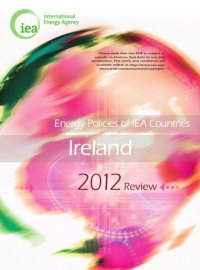
Ebook: Energy Policies of IEA Countries : Ireland 2012
- Genre: Business // Management
- Tags: Energy conservation policy Power resources
- Year: 2012
- Publisher: Organisation for Economic Co-operation and Development
- Language: English
- pdf
Ireland has suffered a significant economic downturn, but remains committed to its ambitious energy targets to bring the country towards a low-carbon economy. Ireland’s location at the edge of the Atlantic Ocean ensures one of the best wind and ocean resources in Europe, and Ireland has set the ambitious target of producing 40% of its electricity from renewable sources by 2020.
Ireland is highly dependent on imported oil and gas. While the push to develop renewable energies is commendable, this will result in an
increased reliance on natural gas, as gas-fired power plants will be required to provide flexibility in electricity supply when wind power is unavailable. With two-thirds of Ireland’s electricity already coming from gas-fired generation, this poses concerns with regard to gas security, particularly as 93% of its gas supplies come from a single transit point in Scotland. In order to meet Ireland’s ambitious renewable targets and improve the island’s level of energy security, the country must successfully develop a range of gas and electricity infrastructure projects and market solutions while continuing to integrate its energy markets with regional neighbours.
Ireland also has a pro-active energy efficiency policy, including a detailed National Energy Efficiency Action Plan outlining 90 measures and actions to be implemented in order to achieve the target of 20% energy savings in 2020.This review analyses the energy-policy challenges currently facing Ireland, and provides sectoral studies and recommendations for the further policy improvements. It is intended to help guide the country towards a more secure and sustainable energy future.
Ireland is highly dependent on imported oil and gas. While the push to develop renewable energies is commendable, this will result in an
increased reliance on natural gas, as gas-fired power plants will be required to provide flexibility in electricity supply when wind power is unavailable. With two-thirds of Ireland’s electricity already coming from gas-fired generation, this poses concerns with regard to gas security, particularly as 93% of its gas supplies come from a single transit point in Scotland. In order to meet Ireland’s ambitious renewable targets and improve the island’s level of energy security, the country must successfully develop a range of gas and electricity infrastructure projects and market solutions while continuing to integrate its energy markets with regional neighbours.
Ireland also has a pro-active energy efficiency policy, including a detailed National Energy Efficiency Action Plan outlining 90 measures and actions to be implemented in order to achieve the target of 20% energy savings in 2020.This review analyses the energy-policy challenges currently facing Ireland, and provides sectoral studies and recommendations for the further policy improvements. It is intended to help guide the country towards a more secure and sustainable energy future.
Download the book Energy Policies of IEA Countries : Ireland 2012 for free or read online
Continue reading on any device:

Last viewed books
Related books
{related-news}
Comments (0)